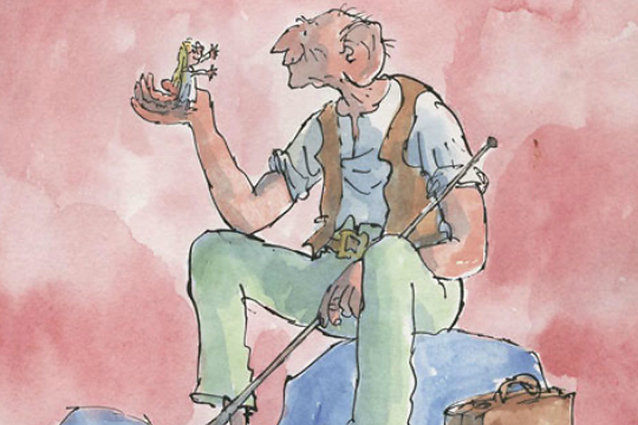 Quentin Blake/ABS-CBN
Quentin Blake/ABS-CBN
Break out the snozzcumbers and pour yourself a glass of frobscottle: The BFG is heading for the big screen, with Steven Spielberg on board to direct. Based on the beloved novel by Roald Dahl, the story follows Sophie, a young orphan girl who befriends the Big Friendly Giant and helps him put a stop to the other, evil giants who have been eating people. The film has been in the works for years now, with screenwriter Melissa Mathison first taking on the project in 2011. According to The Hollywood Reporter, though, Spielberg’s involvement is finally setting the wheels in motion, with the direction aiming to have the film ready for a 2016 release.
Adapting any Dahl novel is a tricky undertaking, but The BFG is one of his most iconic and most fantastic stories, which means in addition to contending with the high expectations that generations of fans have, Spielberg will also need to ensure that the tone of Dahl’s novel translates to the screen. Dahl’s work is characterized by the tone he uses to tell his stories, a mix of whimsical fantasy, heartfelt sentiment, and creeping darkness that is difficult to replicate, which means it will be the biggest challenge that Spielberg will face in adapting The BFG. It’s very easy to veer too far towards camp or sentimentality when bring Dahl’s novels to the big screen, but the most successful adaptations have found a way to replicate that mix of oddity and heart.
It’s such a tricky task to accomplish that despite two different adaptations of Charlie and the Chocolate Factory, neither one has managed to truly bring the world in Dahl’s book to life. Tim Burton’s 2005 version treated the human darkness that grounded the book with a cartoony macabre sensibility, traded in Charlie Bucket’s story altogether in order to give Johnny Depp a stage to show off his take on Willy Wonka with every weird tic he could think of. The attempts to balance out the kookiness resulted in a maudlin backstory for Wonka, and the film swerved between those two poles. The 1971 film came closer, though instead of cloying sentiment, it attempted to balance out Wonka’s eccentricities with a terrifying dark side.
The trick then, as Wes Anderson’s Fantastic Mr. Fox proved, is to find the right balance of lightness, darkness, and insanity. In many ways, Anderson is the ideal filmmaker to adapt Dahl, as their artistic styles have a great deal in common. Both tend to inject their works with a certain amount of surrealism or absurdity, and derive both their comedy and tragedy from there, while grounding their stories in the darker points of reality. Fantastic Mr. Fox works not just because it exists in the same kind of highly-stylized, slightly-odd world that is so commonly associated with Dahl’s work, but also because it finds a way to balance the absurdity of the plot with the very real danger the characters face, and the familial conflict overtaking Mr. Fox’s family. It’s weird and quirky and just a bit twee, all of the things that we associate with a story by Dahl, and it’s the combination of all three elements that make it work.
Of course, it’s still possible for a Dahl adaptation to work even if the filmmaker doesn’t have similar sensibilities to the author himself. Though Dahl wasn’t particularly fond of it, Danny DeVito’s 1996 version of Matilda is a fan favorite, even if it did shift the setting to the United States. It’s a fairly straight-forward interpretation of the story, and at times it’s a big sappier than Dahl’s original work, but by placing the focus squarely on Matilda, the spirit of the novel is able to translate to the screen. The Wormwoods provide the required insanity, Trunchbull gives the film a dark edge, and the magic helps make everything a bit more absurd and fantastic, but the heart of the story is always Matilda, which helps keeps the story grounded and true to the nature of Dahl’s original work.
It’s likely that Spielberg will take a similar approach in adapting The BFG. Though his films have plenty of fun and goofiness, they tend more toward sentiment than absurdity, so it seems that his best route into the world of Dahl would be through the story’s protagonists. He’s proven himself to be adept at both fun adventure stories and heart-warming tales of friendship between human and creature, but finding the right balance of the two can only come from focusing on Sophie and the BFG. His world will provide both the needed goofiness and dark undertones, and both characters are so kind-hearted enough to provide all of the warmth and affection that the story needs, but it’s their friendship that will give Spielberg the key to ensuring that the world he brings to life onscreen is true to the one that Dahl crafted in his story.
And if he doesn’t pull it off, there’s always Matilda: The Musical to fill any Dahl-shaped holes in your life.


